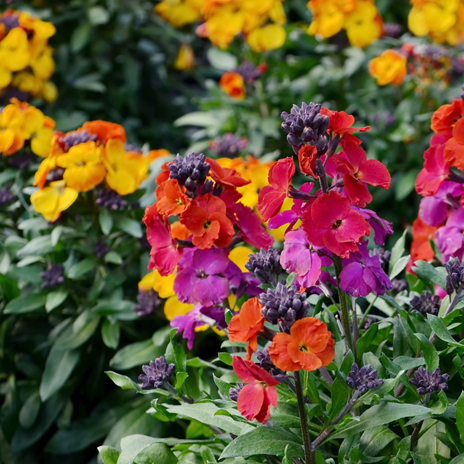
Background
People use wallflower for heart problems, constipation, liver disease, and others conditions, but there is no good scientific evidence to support these uses. Using wallflower can also be unsafe.
Don't confuse wallflower (Erysimum cheiri) with Canadian hemp (Apocynum cannabinum), which is also called wallflower.
Safety Safety definitions
Special Precautions & Warnings:
Pregnancy and breast-feeding: It might be POSSIBLY UNSAFE to use wallflower if you are pregnant or breast-feeding. It contains chemicals that might affect the heart. It's best to avoid use.Heart conditions: Wallflower may cause irregular heartbeat and other heart problems. Don't use it if you have a heart condition.
Effectiveness
- Heart problems.
- Liver disease.
- Gallbladder disease.
- Constipation.
- Starting menstrual periods.
- Other conditions.
Dosing & administration
Interactions with pharmaceuticals
Digoxin (Lanoxin)
Interaction Rating=Moderate Be cautious with this combination.
Digoxin (Lanoxin) helps the heart beat more strongly. Wallflower also seems to affect the heart. Taking wallflower along with digoxin can increase the effects of digoxin and increase the risk of side effects. Do not take wallflower if you are taking digoxin (Lanoxin) without talking to your healthcare professional.
Medications for inflammation (Corticosteroids)
Interaction Rating=Moderate Be cautious with this combination.
Wallflower might affect the heart. Some medications for inflammation can decrease potassium in the body. Low potassium levels can also affect the heart and increase the risk of side effects from wallflower.
Some medications for inflammation include dexamethasone (Decadron), hydrocortisone (Cortef), methylprednisolone (Medrol), prednisone (Deltasone), and others.
Quinidine
Interaction Rating=Moderate Be cautious with this combination.
Wallflower can affect the heart. Quinidine can also affect the heart. Taking quinidine along with wallflower might cause serious heart problems.
Quinine
Interaction Rating=Moderate Be cautious with this combination.
Wallflower can affect the heart. Quinine can also affect the heart. Taking quinine along with wallflower might cause serious heart problems.
Stimulant laxatives
Interaction Rating=Moderate Be cautious with this combination.
Wallflower can affect the heart. The heart uses potassium. Laxatives called stimulant laxatives can decrease potassium levels in the body. Low potassium levels can increase the chance of side effects from wallflower.
Some stimulant laxatives include bisacodyl (Correctol, Dulcolax), cascara, castor oil (Purge), senna (Senokot), and others.
Water pills (Diuretic drugs)
Interaction Rating=Moderate Be cautious with this combination.
Wallflower might affect the heart. "Water pills" can decrease potassium in the body. Low potassium levels can also affect the heart and increase the risk of side effects from wallflower.
Some "water pills" that can deplete potassium include chlorothiazide (Diuril), chlorthalidone (Thalitone), furosemide (Lasix), hydrochlorothiazide (HCTZ, HydroDiuril, Microzide), and others.
Interactions with herbs & supplements
Cinchona: Using cinchona with wallflower may increase the risk of harmful side effects.
Ephedra (Ma huang): Using ephedra with wallflower may increase the risk of harmful side effects.
Herbs that contain cardiac glycosides: Wallflower contains chemicals called cardiac glycosides, which are similar to the prescription drug digoxin. Cardiac glycosides can cause the body to lose too much potassium, and this can harm the heart. Using wallflower with other herbs that also contain cardiac glycosides might increase the risk of heart damage. Herbs that contain cardiac glycosides include black hellebore, Canadian hemp roots, digitalis leaf, gossypol, hedge mustard, figwort, lily of the valley roots, motherwort, oleander leaf, pheasant's eye plant, pleurisy root, squill bulb leaf scales, star of Bethlehem, strophanthus seeds, and uzara. Avoid using wallflower with any of these.
Horsetail: Wallflower contains chemicals called cardiac glycosides. Cardiac glycosides can cause the body to lose too much potassium, and this can harm the heart. Horsetail increases the production of urine (acts as a diuretic) and this can cause the body to lose potassium. There is a concern that using horsetail with cardiac glycoside-containing herbs such as wallflower increases the risk of losing too much potassium and increases the risk of heart damage. Avoid using wallflower with horsetail.
Licorice: Wallflower contains chemicals called cardiac glycosides. Cardiac glycosides can cause the body to lose too much potassium, and this can harm the heart. Licorice also causes the body to lose potassium. There is a concern that using licorice with cardiac glycoside-containing herbs such as wallflower increases the risk of losing too much potassium and increases the risk of heart damage. Avoid using wallflower with licorice.
Stimulant laxative herbs: Stimulant laxative herbs speed up the bowels. As a result, food may not remain in the intestine long enough for the body to absorb minerals such as potassium. This can lead to lower than ideal potassium levels. Wallflower can also cause the body to lose potassium due to the effects of the cardiac glycosides it contains. There is a concern that taking wallflower along with stimulant laxatives herbs can make potassium levels drop too low, and this can harm the heart. Stimulant laxative herbs include aloe, alder buckthorn, black root, blue flag, butternut bark, colocynth, European buckthorn, fo ti, gamboge, gossypol, greater bindweed, jalap, manna, Mexican scammony root, rhubarb, senna, and yellow dock. Avoid using wallflower with any of these.


